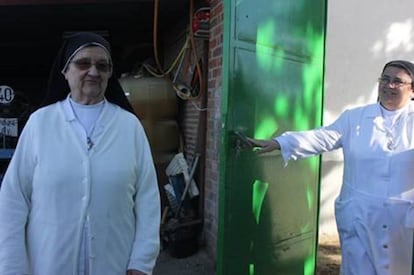The suspicious victory of far-right group Vox in a tiny Spanish town
Could a change in the law, and the nuns who run a residence for women with learning disabilities, have played a determining role on election results in Gotarrendura?

A yellow-and-green plain surrounds Gotarrendura, a village in the Spanish province of Ávila that is home to 161 inhabitants. This year, spring has brought with it two notable rises: the temperatures on local thermometers, and the number of votes that right-wing parties received at the recent general election. The former is thanks to an early summer, which will boost the energy generated by the solar panels that are to be found all around. The latter appears to be the result of a reform to Spain’s electoral law – passed in December – that allows people with learning disabilities to vote for the first time. People like the residents of Villa Santa Teresa, a home for women run by nuns from the Lady of Sorrows order.
It’s an open secret that they manipulated the girls in the center
Local woman from Gotarrrendura
According to the local municipal census, more women than men live in the village: 107 compared to 54. Despite this fact, the far-right party Vox won the April 28 elections there with 50 votes – despite the emerging group’s controversial stance on a number of issues related to feminism. The electoral census has risen sharply in relative terms thanks to the residents of Villa Santa Teresa, which is home to 59 women aged between 29 and 79. The number of votes received by the right has also gone up by the same proportion.
During the run-up to the polls, the nuns at the home reportedly organized a course to explain to their residents the proposals of each candidate, giving them envelopes and ballot papers. Three of the nuns accompanied the women to vote, according to local sources.
Around 100,000 people with mental disabilities were able to vote in the April 28 election thanks to the change in the law. In this village of 149 possible voters, the reform allowed 14 residents of the home to register. What’s more, another 14 were encouraged to come with them to vote, half of whom had abstained in prior occasions – their level of disability did not prevent them from voting. If the result seen at the general elections were to be repeated at the upcoming municipal polls, a Vox candidate would become mayor, beating out the current group in power, the Popular Party (PP). Vox, however, will not be running in Gotarrendura at the upcoming May 26 local elections.
The sisters gave us voting slips and told us not to say anything
Resident of Villa Santa Teresa
The April 28 vote saw 15 more people on the Gotarrendura census, 14 of them women with learning disabilities. In total, there were 25 more votes cast than at the last general election – 21 of which correspond to the residence. The rise in votes for the PP and Vox (25) coincides with the rise in voters. This bloc now has 86 votes compared to 61 last time around, leaving 24 for the remaining parties (previously 23).
The nuns at the Villa Santa Teresa residence had prepared everything ahead of the elections. While some of the women there dance to reggaeton music in the courtyard, one of the residents tells journalists about their first experience of voting. “The sisters gave us voting slips and told us not to say anything.” Her colleagues agree and, amid giggles, say that they voted “for Jesus Christ.” The majority of the women say that they admire Vox leader Santiago Abascal.
The management at the residence denies having supplied the women with their voting slips. But Valeriano de Juan, who was the head of the local voting station, confirms the version offered by the residents: “They all came with their ballot papers ready.”
The April 28 vote saw 15 more people on the Gotarrendura census, 14 of them women with learning disabilities
The mayor of the village, Yolanda de Juan (PP), attributes the victory of Vox to the new voters. A local woman offers her take on the situation: “It’s an open secret that they manipulated the girls at the center.”
Another resident explains that the nuns gave them a workshop with political “guidelines.” Despite the denials of the management of the residence, she is categorical. “They gave us practical talks about the parties: who is against the Church and who is in favor of abortion or euthanasia.”
In the village where, according to tradition, Saint Teresa was born, the so-called miracle took place when everyone else was in Mass. The people staffing the voting station were the only ones to see the arrival of the residents of Villa Santa Teresa and the nuns. In just half an hour, the ballot boxes were full of votes.
English version by Simon Hunter.
Tu suscripción se está usando en otro dispositivo
¿Quieres añadir otro usuario a tu suscripción?
Si continúas leyendo en este dispositivo, no se podrá leer en el otro.
FlechaTu suscripción se está usando en otro dispositivo y solo puedes acceder a EL PAÍS desde un dispositivo a la vez.
Si quieres compartir tu cuenta, cambia tu suscripción a la modalidad Premium, así podrás añadir otro usuario. Cada uno accederá con su propia cuenta de email, lo que os permitirá personalizar vuestra experiencia en EL PAÍS.
¿Tienes una suscripción de empresa? Accede aquí para contratar más cuentas.
En el caso de no saber quién está usando tu cuenta, te recomendamos cambiar tu contraseña aquí.
Si decides continuar compartiendo tu cuenta, este mensaje se mostrará en tu dispositivo y en el de la otra persona que está usando tu cuenta de forma indefinida, afectando a tu experiencia de lectura. Puedes consultar aquí los términos y condiciones de la suscripción digital.








































